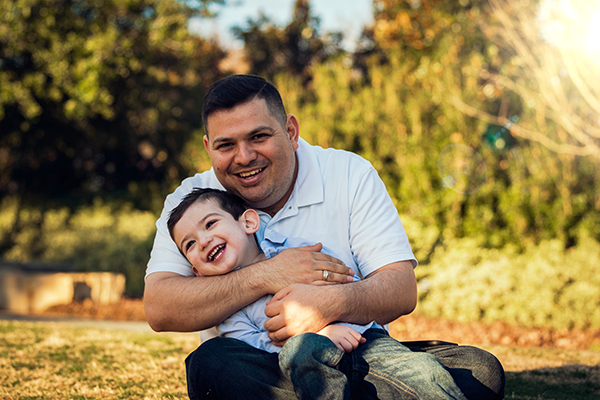Sometimes we overlook even the obvious.

To be the father of three children—now three adults—has been my privilege. For a while, I was also a foster father. I’ve always been aware of my imperfections as a father and routinely have asked the Lord to forgive and to “restore the years the locust has eaten” (Joel 2:25)1 in the lives of my children as a result of any negligence or spiritual nearsightedness on my part. I’m no expert on fatherhood, but the following thoughts are the result of conversations with God as well as personal experience and reflection.
Essential Functions of a Father
Fathers perform numerous essential functions in their families; here are what I consider the top five:
A Father Procreates. This may seem too obvious to include in a list of five essentials, but it’s important to start at the beginning. To become a father is not merely a matter of physical procreation; rather, it’s to produce a new life, a life that eventually will be independent, intelligent, able to make decisions, and even to impact the world in positive ways. Even though human beings are created “a little lower than the angels” (Ps. 8:4, 5), they have the God-given ability of procreating in their image, something the angels cannot do (Matt. 22:30).
How many children in the world are considered “accidents” of life? How many are unwanted? It’s a beautiful thing that God has led loving, kindhearted souls across the world to be willing to adopt “mistake” children, orphans, or those abandoned by or taken from parents because of tragic or challenging circumstances. That is never God’s first plan, but we live in a world of sin that results in less-than-ideal situations. The ideal is for a husband and wife, having asked for the blessing of God in their marriage, to pray and discuss together this concept of a new life. It takes two, both a man and a woman, to create a child. Men who give little thought to and are not thoroughly engaged in the raising of their children, however, are not true fathers. Before deciding to bring a child into the world, men need to ask themselves: Do I wish to raise a child? Am I willing to dedicate time to my children? Will I dream of the highest aspirations for my offspring? If the answer to these questions is “Yes,” then you may be ready to become a father.
A Father Provides. Providing food and shelter is what fathers—and often mothers as well—do. I love reading in the Bible about how our heavenly Father provides all that we need (Matt. 6:25, 26, 31-33). Earthly fathers also must provide for their children, and to do that, if at all possible, they need to be gainfully employed and responsible at their jobs; otherwise, those basic life needs will be difficult to meet.
But this is only the first step in the “provision” category. An even more critical aspect is providing emotional and spiritual support, which is key to the well-being of growing children as well as to the mother. Many years ago I remember reading a statement by Charlie Shedd, a well-known specialist on families, that the key to loving our children was loving their mother. How utterly true that is! I’ve always been amazed at the enormous capacity of mothers to love and care for their children, especially when they feel solidly supported by loving husbands. A man is not a father just because he produces children. Most healthy men can do that. A man is a father when he gives and gives and continues to give of himself, comprehensibly, for the welfare of his family.
A Father Protects. Even Hollywood turns out movies about quintessential fathers who will go to any lengths to protect their children and families from fierce and persistent enemies. But this issue is much more subtle than Hollywood would make us believe. The protection of our children has much less to do with fending off criminals or abusers than with guarding our children from the inappropriate use of technology and the association of friends who will damage our children’s lives. A father must be involved in the life of his son or daughter. And while that may be relatively easy to do while the children are young, involvement in the lives of teenagers becomes more complex.
To be involved in the lives of 14- or 15-year-olds begins many years before. There’s an inherent trust that needs to be built when children are young that many fathers tend to ignore. It’s not merely having playtime with them, it’s truly engaging with them as little persons that God is graciously developing. Children need to sense that their fathers—as well as their mothers—are actually their very best friends. To reach that stage will take thought and focused effort by the caring father. Once that bond is clear and unbreakable, counsel to their teenagers will be much better accepted.
A Father Prescribes. If a father keeps up with the first three essentials already mentioned, he could be considered a “pro,” sufficiently adept for fatherhood. But it’s with these last two essentials that fathers can make the greatest difference for their children.
A father “prescribes” because he’s, basically, the family doctor—the spiritual doctor of the family. This is a God-given responsibility (Eph. 6:4). He must be in tune with the words and wisdom of God so he can know when something unhealthful or harmful is creeping into the household and must be extricated. He’s the first line of defense and needs to cast a vision for what’s good and wholesome.
Prescribing what’s best is a teaching function, but it’s also a tricky thing. Knowing or understanding the consequences of wrong ideas or decisions is not enough to produce good spiritual health. Knowing how and when to convey this, how to teach children what to do in a specific circumstance, is just as critical (Deut. 6:5-7). Working together, doing projects together with your children, is what will give fathers the best chance to prescribe life in an organic, natural way.
A Father Prays. A father prays before conception. A father prays during his wife’s pregnancy and delivery. A father prays as his children grow. He prays every day for them, for their challenges, their burdens, their aspirations, their education, their vocation, their future mate and family. If there’s one thing a father should always do, even years and decades after his children are grown and have left home, is to pray. He may no longer bring more children into the world; he may no longer need to protect or substantially provide for his children; and his opportunity to prescribe may be considerably limited. But a godly father knows there is One who has always been with him on this long journey. And to Him he prays for his now-grown children every day, every hour. A caring father never ceases to be a father, and intercession for his children becomes the number-one objective every day of his aging life (see Job 1:4, 5).
More than one father I know has come to realize, after his children are grown, how neglect of prayer for his children when young may have contributed to near irreversible damage in their lives. These fathers have to learn, as older men, what it’s like to surrender to Christ and trust surrendering their children entirely into His hands. Oh, how very good God is to allow fathers one key function throughout their lives after all others may have been stripped away! A father who prays, who earnestly prays in faith for his children and grandchildren, will not be disappointed (see Rom. 10:11, NASB).2
It Doesn’t End Here
Other functions beginning with the letter “P” could have been included here, such as “a father plays.” And we could have discussed what fathers should not do, such as “pontificate” or “procrastinate.” But the functions discussed here are what I see as the five most crucial essentials. Fathers will do well if they keep these in mind.
My favorite “father” text in the Bible is 1 John 3:1, 2: “Behold what manner of love the Father has bestowed on us, that we should be called children of God! . . . Beloved, now we are children of God; and it has not yet been revealed what we shall be, but we know that when He is revealed, we shall be like Him, for we shall see Him as He is.”
What an amazing heavenly Father we have! We do not yet look, act, or sound like Him as well as we should, but He still calls us His own.
1 Unless otherwise noted, Bible texts are from the New King James Version. Copyright ã 1979, 1980, 1982 by Thomas Nelson, Inc. Used by permission. All rights reserved.
2 Scripture quotations marked NASB are from the New American Standard Bible, copyright © 1960, 1962, 1963, 1968, 1971, 1972, 1973, 1975, 1977, 1995 by The Lockman Foundation. Used by permission.








